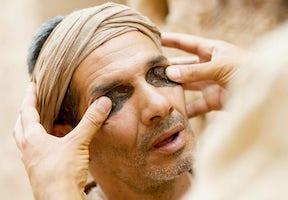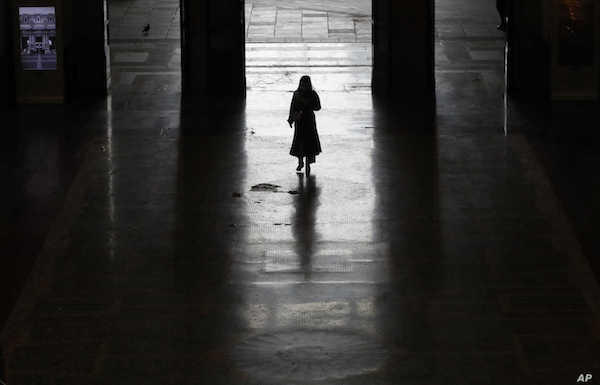 Last week, in the first of my sermon/blog posts on the Sunday Gospels (written in lieu of homilies at Mass during pandemic in Lent), it was consoling to reflect on the interchange of Jesus and the woman at the well in the Gospel of John 4; we could see how Jesus broke boundaries, and we could appreciate the good that came of it, and the Samaritans persuaded him to stay with them for several days. John 9 is this week’s Gospel (March 22). It is the story of the man born blind who is cured, but it offers no ready consolation. I have always found it to be one of the darkest chapters of the New Testament. (It is even disturbing on an elemental level, given John’s extremely negative portrayal of “the Jews.” See my comment at the end of this piece.)
Last week, in the first of my sermon/blog posts on the Sunday Gospels (written in lieu of homilies at Mass during pandemic in Lent), it was consoling to reflect on the interchange of Jesus and the woman at the well in the Gospel of John 4; we could see how Jesus broke boundaries, and we could appreciate the good that came of it, and the Samaritans persuaded him to stay with them for several days. John 9 is this week’s Gospel (March 22). It is the story of the man born blind who is cured, but it offers no ready consolation. I have always found it to be one of the darkest chapters of the New Testament. (It is even disturbing on an elemental level, given John’s extremely negative portrayal of “the Jews.” See my comment at the end of this piece.)
A certain darkness – even blindness – pervades the chapter, from start to finish. First, there is a man born blind, and we learn only rather mysteriously what his blindness means or rather does:
As he walked along, he saw a man blind from birth. His disciples asked him, “Rabbi, who sinned, this man or his parents, that he was born blind?” Jesus answered, “Neither this man nor his parents sinned; he was born blind so that God’s works might be revealed in him. (1-3)
But what are God’s works? There is a healing early in the chapter, involving both physical detail and the demands of faith:
When he had said this, he spat on the ground and made mud with the saliva and spread the mud on the man’s eyes, saying to him, “Go, wash in the pool of Siloam” (which means Sent). Then he went and washed and came back able to see. (6-7)
But that is over and done with by verse 7, yet the chapter is 41 verses long. There is no celebration mentioned, no marveling at this miracle, no rejoicing, no thanking God. The neighbors seem slightly put off, that the “man born blind” is now something else – a case of mistaken identity? does he even have a name? what to do with him now that he is no longer "the beggar"?
The neighbors and those who had seen him before as a beggar began to ask, “Is this not the man who used to sit and beg?” Some were saying, “It is he.” Others were saying, “No, but it is someone like him.” He kept saying, “I am the man.” But they kept asking him, “Then how were your eyes opened?” He answered, “The man called Jesus made mud, spread it on my eyes, and said to me, ‘Go to Siloam and wash.’ Then I went and washed and received my sight.” (8-11)
Like them, the Pharisees who pursue the interrogation do not believe that such a cure is possible, certainly not here and now, by Jesus:
They brought to the Pharisees the man who had formerly been blind. Now it was a sabbath day when Jesus made the mud and opened his eyes. Then the Pharisees also began to ask him how he had received his sight. He said to them, “He put mud on my eyes. Then I washed, and now I see.” Some of the Pharisees said, “This man is not from God, for he does not observe the sabbath.” But others said, “How can a man who is a sinner perform such signs?” (13-16)
The chapter therefore has meanings - and its real meaning - beyond eyesight for a blind man. That is, the stark, abrupt intervention of Christ in the sad condition of the man born blind spirals downward into stark judgments on everyone else: the clueless disciples who just want to know who to blame for his blindness; the neighbors who are unsettled by the sudden change; his own parents, fearful for themselves, who pull back and leave it to their son to speak for himself; and, again, the Pharisees, who seem to take treat this as a crime scene: who is to blame for this cure? Even at the chapter’s end, the darkness is unalleviated:
Some of the Pharisees near him heard this and said to him, “Surely we are not blind, are we?” Jesus said to them, “If you were blind, you would have no sin. But now that you say, ‘We see,’ your sin remains. (40-41)
None of this is very comforting. Jesus does cure, but only by removing blindness in a dark, cold, unthankful, unseeing space. What is there worth seeing? Perhaps we are being shown – if we ourselves will see it – that our world was in pandemic state even before the coronavirus first caught our attention. Too often we take for granted the suffering of others. We may be curious but do not really care about the (to us) unimaginable suffering of other people in other places: the poor, the refugees, the oppressed and excluded, the homeless, the imprisoned, those born with ailments we wish we could assign blame for, the unborn. We are oddly inconvenienced if it turns out that if “the poor and the disadvantaged” have real voices and can really speak, see us, talk to us as our equals: “I am the man.”
The pandemic is opening our eyes to uncomfortable truths, as even the comfortable are discomforted. I know that I have had a long and thus far privileged life. It is only in rare moments, such as right now, that I begin to realize that I am not really immune to the troubles I read about in the newspaper every day. I could be the next victim! We see a blind man’s eyes opened, expect it to be an item of good news to cheer our day: but athe whole thing forces us to decide whether we really want to see what our world is really like:
Jesus said, “I came into this world for judgment so that those who do not see may see, and those who do see may become blind.” (39)
So there we are: a cure, amid still greater blindness.
Except of course, I have skipped the one sign of hope: the man himself. He is no defective lesser being, a victim to be helped and then sent off. Through the whole story, he is the one who knows what has happened, what is true, and even what is still beyond him:
They said to him, “Where is he?” He said, “I do not know.”
So they said again to the blind man, “What do you say about him? It was your eyes he opened.” He said, “He is a prophet.”
He answered, “I do not know whether he is a sinner. One thing I do know, that though I was blind, now I see.”
They said to him, “What did he do to you? How did he open your eyes?” He answered them, “I have told you already, and you would not listen. Why do you want to hear it again? Do you also want to become his disciples?” (12, 17, 25, 26-27)
But most beautifully of all,
Jesus heard that they had driven him out, and when he found him, he said, “Do you believe in the Son of Man?” He answered, “And who is he, sir? Tell me, so that I may believe in him.” Jesus said to him, “You have seen him, and the one speaking with you is he.” He said, “Lord, I believe.” And he worshiped him. (35-38)
Like the woman at the well and her neighbors who welcomed Jesus and recognized his lordship, like the woman caught in adultery (John 7-8), this man no longer blind has learned from his marginality, outsider status, disadvantage. In all that time that he sat there as a beggar, he was always paying attention, listening, noticing how people were acting toward him and one another. Blindness made his every other sense all the more acute.
 Perhaps then another message for us in our time of crisis is this: however we may have imagined this year to proceed, and however upset we are – even if we are not (yet) actually sick - the crisis puts life right before in front of us: our whole lives pass before our eyes, as they say. However bad it is, the pandemic – to be blamed on no one – serves a purpose, that God’s works might be revealed in it. The pandemic will become a matter of history, but the starker choice before us won’t go away: shall we be blind to our neighbors in need, bothered when their humanity and rich complexity become too evident, wed more to our ordinary ways of doing things than to God’s glory at work in the world? Or can we come to say, “Lord, I too believe”?
Perhaps then another message for us in our time of crisis is this: however we may have imagined this year to proceed, and however upset we are – even if we are not (yet) actually sick - the crisis puts life right before in front of us: our whole lives pass before our eyes, as they say. However bad it is, the pandemic – to be blamed on no one – serves a purpose, that God’s works might be revealed in it. The pandemic will become a matter of history, but the starker choice before us won’t go away: shall we be blind to our neighbors in need, bothered when their humanity and rich complexity become too evident, wed more to our ordinary ways of doing things than to God’s glory at work in the world? Or can we come to say, “Lord, I too believe”?
Afterword: The chapter is marred by the author’s unrelievedly negative view of the Pharisees, alternatively called merely “the Jews.” This Gospel does this a lot, and as read, has done a lot of damage over the centuries. We are well beyond the time when we can simply overlook the problem, giving the Gospels a free pass. We should not stop learning from John, but we must remember always that whatever the experience of the tiny Johannine community, the Gospel has a few poisonous elements that enabled it to be used in harmful ways over the generations. But perhaps our eyes are now painfully opened to this too: even on the best of days, when the light shines in a miraculous way, the darkness remains very nearby, inside, not merely outside.

